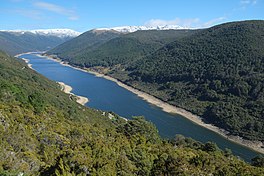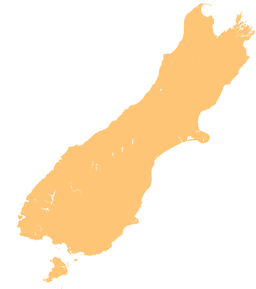Cobb Reservoir
| Cobb Reservoir | |
|---|---|
 Cobb Reservoir in autumn | |
| Location | New Zealand |
| Coordinates | 41°07′16″S 172°39′28″E / 41.121014°S 172.657796°E |
| Type | reservoir |
| Primary inflows | Cobb River |
| Primary outflows | Cobb River |
| Built | 1949–1954 |
| Max. length | 6 kilometres (3.7 mi) |
| Max. width | 450 metres (1,476 ft) |
| Water volume | 25,600,000 m3 (900,000,000 cu ft) when full[1] |
| Surface elevation | 819 metres (2,687 ft)[2] |
The Cobb Reservoir, surrounded by Kahurangi National Park and fed by the Cobb River, is in the South Island of New Zealand. The reservoir feeds the Cobb Power Station and is 819 metres (2,687 ft) above sea level but drops significantly with low rainfall.[3] Cobb Reservoir is the highest hydro storage lake in New Zealand.[4]
The dam that forms the reservoir was built from 1949 to 1954, replacing a smaller structure built about ten years earlier. It is an earth dam 32 metres (105 ft) high by 221 metres (725 ft) long. The geology of the area precluded the construction of a concrete dam.[5]
A narrow winding road leads over Cobb Ridge to Cobb Reservoir and along the lake's shore, providing access to tramping tracks in the area surrounding the valley. The road was built in the 1940s and remains unsealed from Cobb Power Station onwards.[1]
See also
References
- ^ a b "Cobb Valley". Department of Conservation NZ. Retrieved 2015-12-03.
- ^ "Cobb Reservoir, Tasman - NZ Topo Map". NZ Topo Map. Land Information New Zealand. Retrieved 2015-12-03.
- ^ Fairfax NZ News (8 April 2008). "Cobb Reservoir level dangerously low". The Nelson Mail. Retrieved 24 February 2013.
- ^ "IPENZ Engineering Heritage". IPENZ. Retrieved 2015-12-03.
- ^ Martin, John E. (1999). People, politics, and power stations: electric power generation in New Zealand, 1880-1998. Electricity Corp. of New Zealand and Historical Branch, Dept. of Internal Affairs. ISBN 9780908912988.

